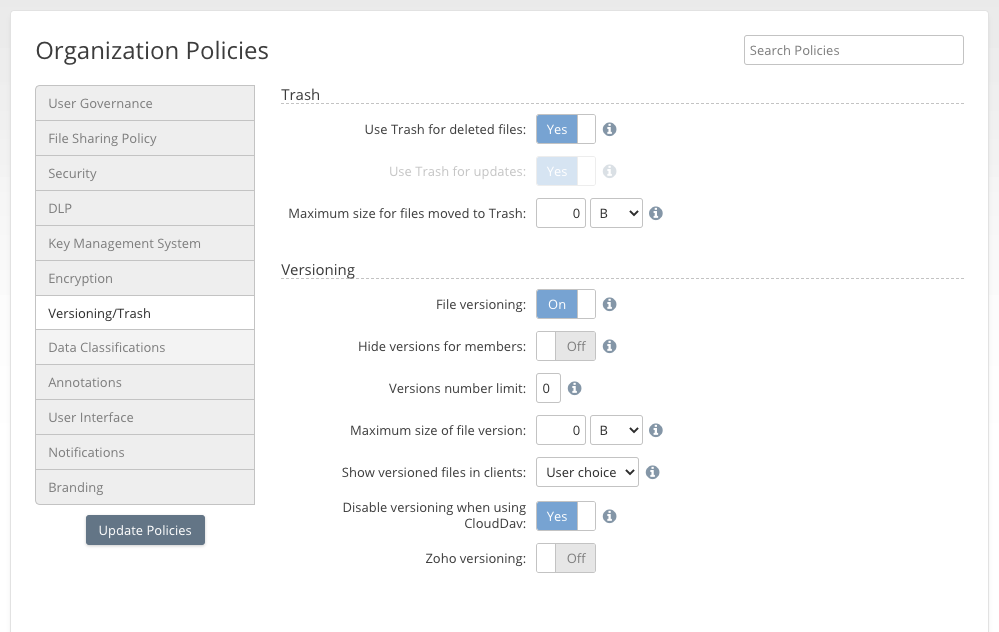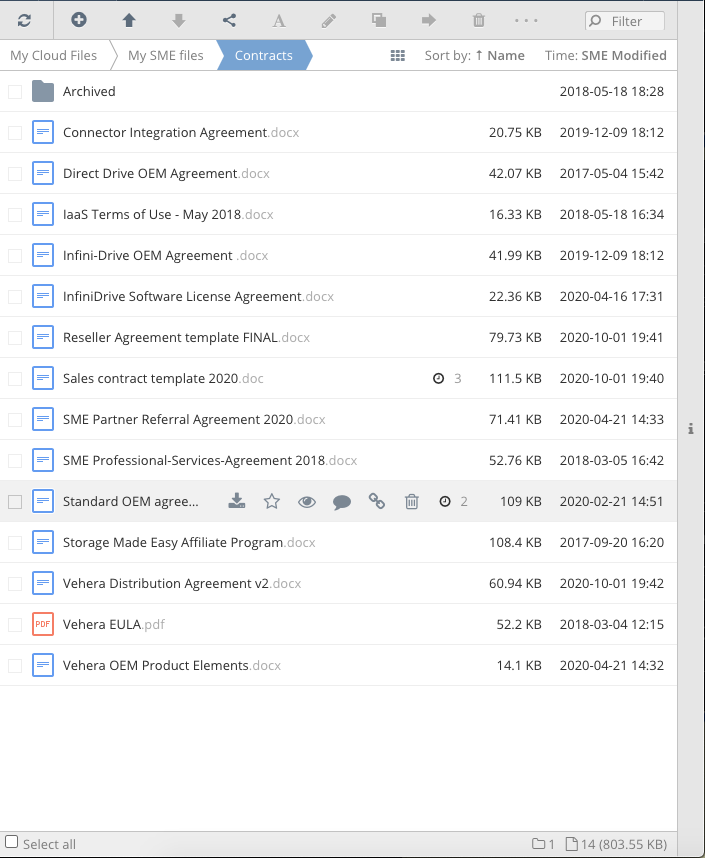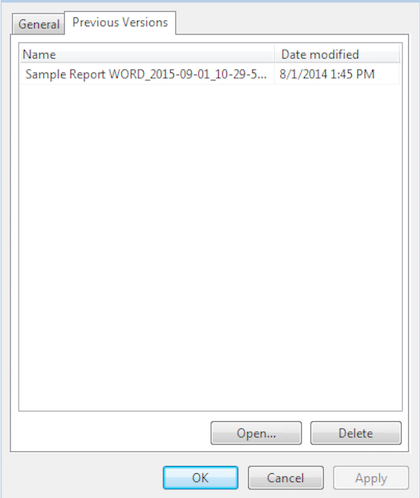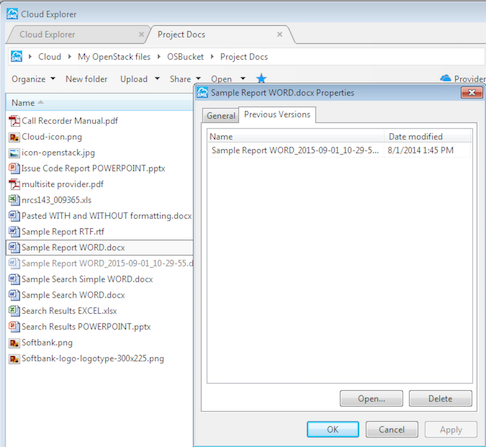**This is an old revision of the document!**
File Versioning
last updated on August 12, 2021
Introduction
File Versioning is built into the File Fabric solution. This works against any storage that is mapped to the File Fabric and is independent of any versioning that may be provided by the storage itself (with the notable exception being OpenStack which has an integrated File Fabric/OpenStack versioning option for the File Fabric Enterprise on-premises edition).
Files are versioned when:
- Versioning in the File Fabric Policies is set to “on” then prior versions of the files are appended with a date stamp and these will also reside in the same directory on the storage.
- Trash is set to “on” - when Trash is switched on then old versions of the files are appended with a date stamp and moved to the Trash folder and are not removed until removed from the File Fabric trash. Trash can be set to “off” if required and when this is the case files are instantly removed.
Turning on versioning
Versioning can be turned on:
At a team level from the Policies→Versioning section.
Version limits
Versioning limits of stored file versions can be controlled from the account policies » Versioning/Trash »Versioning.
When increased, the version limit will increase to the newly set number.
The version limit you set is the number of version files that will be stored in addition to the current version of the file. For example, if you set the versions limit to 3 then you can have the most current file plus three versions. When the version limit has been reached for a file and you upload another copy of the file, the oldest version file is removed from the File Fabric's metadata and from the storage.
Decreasing versions
From Policies » Versioning/Trash »Versioning
The Versions number limit can be reduced, upon which three options are given for what user wants to do with the extra versions:
- Keep existing versions
- Move to trash
- Delete permanently
-if option 1 is selected then the extra versions will remain as is
-if option 2 is selected then the extra versions will be moved to trash but will remain on the provider
-if option 3 is selected then the extra versions will be deleted from the provider
Hiding file versions from File Fabric Clients
The File Fabric has a feature that turns off the view of file versions in File Fabric Apps.
This can be set as Team Admin from the Options→Versioning section.
File Fabric Apps
Many of the File Fabric client Apps also have the capabilities to deal with access to file versions. The section below outlines how File Fabric Apps deal with access to file versions:
Web
The Web File Manager displays versions using a 'visual versioning' paradigm in which versions are 'rolled up' so that how many versions of a file can be easily seen without cluttering up the interface.
Clicking the versions link expands the versions, which can be accessed or promoted to be the current version.
Windows
The Windows Cloud Drive and Windows Explorer enables access to prior versions of a file.
Versions can be access on a document in the windows drive by right clicking the file, choosing cloud actions and then properties and opening the tab 'previous versions'.
The Windows Cloud Explorer App can also access prior file versions by right clicking on a document, choosing properties, and choosing the tab 'previous versions.
Mac
In the Mac Apps prior versions can be viewed as files with datastamp appended. You will need to turn hiding file versions to off.
Linux
In Linux Apps prior versions can be viewed as files with datastamp appended. You will need to turn hiding file versions from SME Clients to off.
iOS App
The iOS App has support for versioning and displays the number of file versions in the file manager. These can then be accessed and opened from within the App.
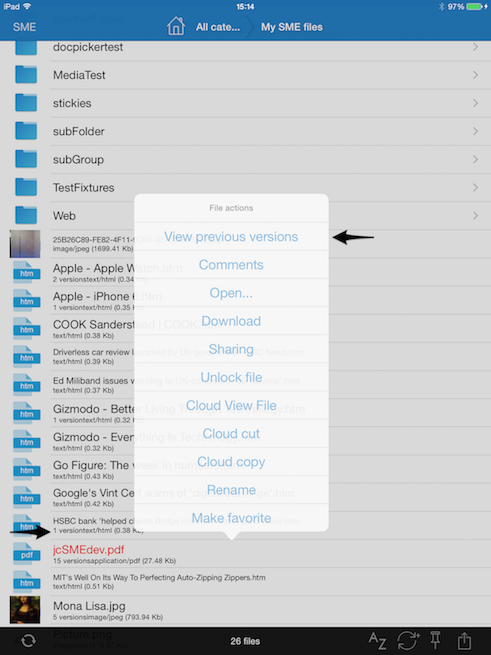
Android App
In the Android App prior versions can be viewed as files with datastamp appended. You will need to turn hiding file versions from File Fabric Clients to off.
Protocol Adaptors
The File Fabric Protocol Adaptors (WebDav, FTP, SFTP etc) will honour what has been setup within the File Fabric for file versioning. The WebDav protocol adaptor has a special setting that enables versioning to be on at a global level but turned off when using the File Fabric clouddav protocol adaptor.
This is accessible from Options→Versioning section (business and enterprise users.)
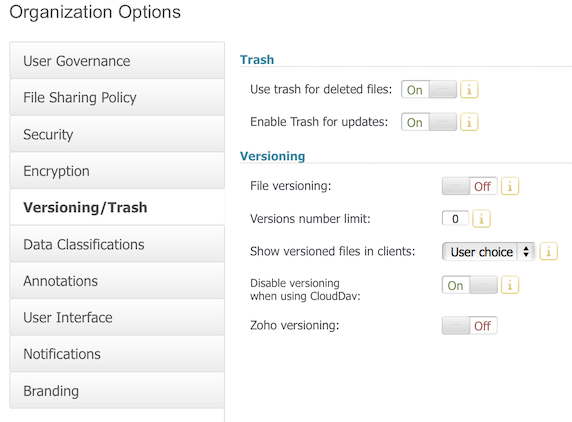
Native Cloud Storage Provider File versioning
Although the File Fabric provides support for versioning above what is provided by the storage some storage providers provide their own versioning. To take advantage of this simply set the File Fabric versioning to 'off' and the mapped Storage will continue to version files in its own platform.
NOTE For enterprise Appliance customers the File Fabric provides integration with OpenStack versioning in that there is an option to directly directly map the File Fabric versioning to OpenStack versioning.

